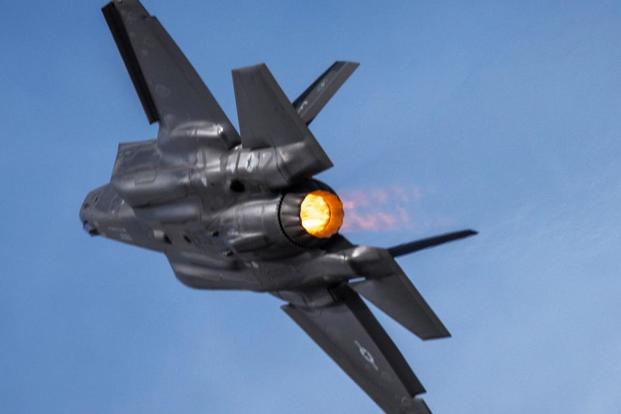Luke Air Force Base expects to receive two additional F-35A Joint Strike Fighters for its pilot training program with Turkey in coming weeks, even as officials debate complexities surrounding the NATO ally's involvement in the program.
Two jets are expected to arrive at the Arizona base next month, 56th Fighter Wing spokeswoman Maj. Rebecca Heyse said during a phone call Friday.
The first group of Turkish pilots and instructor-pilots have graduated the training program with the 63rd Fighter Squadron as the second and third groups have begun entry-level training at Luke or in San Antonio, Texas, she added.
Heyse could not disclose the number of pilots in the program for operational security and privacy reasons. The first group, which began training in July, will remain at Luke to teach and work with future groups, she said.
Turkish President Recep Tayyip Erdogan announced this weekend that his country -- which hosts Incirlik Air Base, a key Air Force hub -- will continue with its purchase of the Russian-made S-400 surface-to-air missile system.
Related content:
- Turkey Can't Have Both F-35s and Russian Missile System, NATO Commander Says
- Sale of F-35s to Turkey in Trouble, Dunford Confirms
- No Change Expected in Turkey's F-35 Program Until Mattis Submits Report
The deal troubles Defense Department officials, who have said the purchase could result in Turkey's ouster from the F-35 program. Reuters reported last week that the U.S. is considering halting preparations to deliver the F-35 to Turkey in light of its efforts to acquire the Russian system.
"The S-400 is a computer. The F-35 is a computer. You don't hook your computer to your adversary's computer, and that's basically what we would be doing," Katie Wheelbarger, acting assistant secretary of defense for international security affairs, told the news outlet in an interview.
Responding to the Reuters report, Joint Chiefs Chairman Gen. Joseph Dunford said Thursday that he "would have a hard time" justifying future F-35 sales to Turkey.
"We're hopeful to find a way through this, but it's a tough issue," he said during a discussion at the Atlantic Council on Thursday.
The program of record for F-35 sales and pilot training for Turkey remains unchanged, a DoD official said on background Friday.
Congress could create legislation to block delivery of the jets to Turkey, a move slated to occur between late summer and the end of the year, the official said.
In the 2019 National Defense Authorization Act, lawmakers temporarily blocked F-35 transfers until then-Defense Secretary Jim Mattis and Secretary of State Mike Pompeo submitted a report to Congress describing the current U.S.-Turkey relationship and whether keeping the F-35 from Turkey would hurt production, training or other partnerships.
Turkish defense companies have produced part of the plane since 2002, in conjunction with Lockheed Martin Corp., the F-35's manufacturer.
The lawmakers' temporary block was also related to "a hostage situation" involving American pastor Andrew Brunson. (Brunson was freed in October.)
The classified report was submitted in November, the official said. A few highlights surfaced later that month, saying "the administration will reassess Turkey's continued participation as one of the eight partner nations should they continue their purchase of the S-400," according to a two-page summary reported by Bloomberg.
The DoD official said the situation remains a diplomatic issue for now, as the Pentagon awaits further guidance from the White House or Congress.
Turkey wants to buy 100 of the F-35A variant used by the U.S. Air Force. The country took delivery of its first F-35 last June in a ceremony at Lockheed's Fort Worth, Texas, facilities, amid the legislative efforts to halt future deliveries. Two F-35s were then transferred to Luke.
In an effort to keep Turkey away from Russian-made weapons, the State Department in December approved the potential sale of the Patriot missile system and related equipment to the country for $3.5 billion.
Both Lockheed and Raytheon Co. build parts of the long-range Patriot surface-to-air missile system. Officials have touted the Patriot to Turkey for years, and the country expressed interest in the system after the war in Syria began in 2012.
But according to the Daily Sabah Diplomacy, a Turkish news site, unidentified officials who spoke to the paper in July said the Patriot isn't a suitable alternative to the S-400.
While U.S. officials are committed to ongoing negotiations, Turkey in February rejected the latest sale proposal, Bloomberg said.
-- Oriana Pawlyk can be reached at oriana.pawlyk@military.com. Follow her on Twitter at @Oriana0214.














